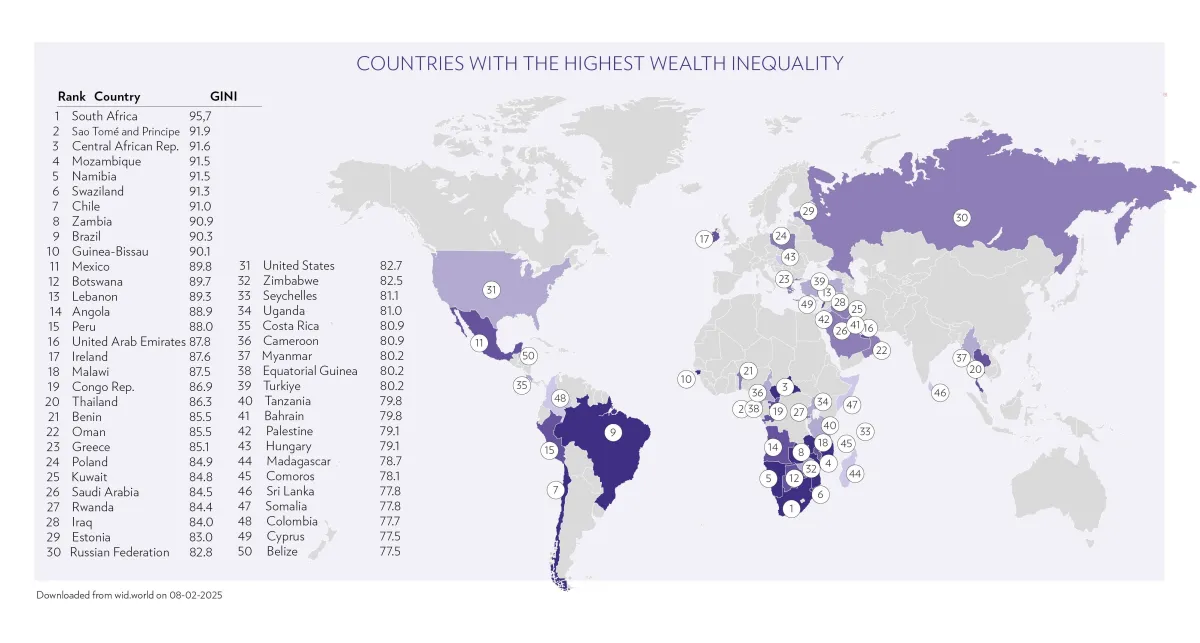Wealth inequality is one of the most pressing global issues of our time. The concentration of wealth affects individuals and communities in numerous ways. Wealth inequality restricts access to education, healthcare, technology, and the ability to generate income, trapping people in a cycle of disadvantage. As a result, it limits opportunities and social mobility – the chance of moving up.
This imbalance also fuels many of today’s urgent topics. As Cristóbal Rovira Kaltwasser, associate researcher at the Centre for Social Conflict and Cohesion Studies (COES), mentions in our Wealth Inequality Initiative Podcast #3:
Wealth inequality is not just an economic issue – it underpins many of today’s global challenges, from social unrest and conflict to climate change, and the erosion of democratic trust.
Global wealth disparities
Currently, the bottom 50% of the global population possesses less than 2% of worldwide wealth, whereas the top 1% holds over one-third. However, wealth inequality is not the same everywhere. The Gini Index determines a nation's level of inequality by measuring the income distribution or wealth distribution across its population.

60 facts on wealth inequality
To understand wealth inequality and its impact on society better, discover our 60 fact series.
Understanding Wealth Inequality
Wealth inequality is the unequal distribution of assets among individuals, groups, or organisations within a society or country. While income is earned by individuals on a monthly or annual basis, wealth is amassed over the years primarily in families and households. Therefore, changes in wealth inequality tend to take longer to manifest than those in income inequality. Furthermore, wealth inequality encompasses not only financial disparities, but also the lack of social capital, which limits access to essential networks and opportunities.
The issue is multi-faceted. A range of factors lead to the uneven distribution of opportunities, income, and wealth globally. Its complexity stems from multiple, interrelated causes that amplify one another. Limited access to education, inadequate healthcare, or poor-quality housing can constrain people’s financial opportunities, which in turn diminishes abilities to thrive. The consequences of this inequality are far-reaching, creating social instability and resentment that affects all levels of society.
According to the Global Risks Report 2025 by the World Economic Forum, “inequality (wealth, income) is perceived as the most central risk of all, playing a significant role in both triggering and being influenced by other risks.”
Addressing this challenge requires coordinated action from individuals, communities, institutions, and systems alike.
Glossary
For definitions of key terms related to wealth inequality, refer to our comprehensive glossary.
Why it matters for everyone
Wealth inequality can have various social, economic, and political implications:
Negative impact on economy
- Increases in wealth inequality lead to productivity slowdowns
- High wealth concentration can shift financial resources away from growth-enhancing investments and towards wealth protection
Reduce state capacity
- Tax evasion & avoidance affects redistributive measures (public investment, welfare infrastructrue & services)
- Corruption and misapproriation of funds hinder global justice and SDGs
- Decreased capacity of domestic governement and institutions to have access to capital
Reduce resilience
- Leads to more macroeconomic instability
- Households vulnerable to sudden schocks (e.g health)
- High indebtedness
Negative socio-political consequences
- Affects trust, risks of populism and has negative impact on social cohesion and increases stratification
- Lower creditor and worker protection
- Marginalised groups can exert less pressure towards laws that work in their favor
By contrast, more equal societies experience stronger institutions, higher levels of trust, and social cohesion. Reducing inequality is not just a moral imperative — it is a smart investment in collective resilience and shared prosperity.
As the UN’s Sustainable Development Goals highlight, reducing inequality is central to achieving a just, stable, and sustainable world.
Knowledge hub
For in-depth information on wealth inequality, explore our Knowledge hub, featuring expert interviews, research studies, and practical examples.
The importance of social mobility to address wealth inequality
What someone is able to achieve depends not only on their talent, or effort, but also on the environments they navigate and the connections they can rely on. Without access to social capital, which provides networks and opportunities, individuals are often excluded from the spaces where these opportunities arise. It is about having the right connections. Networks can open doors — or close them when they are missing, excluding people from the chances to grow.
Social mobility is limited when access to resources is concentrated within closed circles. That is why it is essential to enable more people to build networks across social and economic boundaries. Especially in today’s rapidly changing world, opening up access to education, capital, mentoring, and professional relationships is key to levelling the playing field and fostering inclusive progress.
At the Wealth Inequality Initiative, we support efforts that expand access — not only to tangible resources, but also to skills, experiences, and networks. We believe in the power of collaboration across the wealth divide and want to inspire change through the lives and learnings of people who are building bridges and driving transformation.
